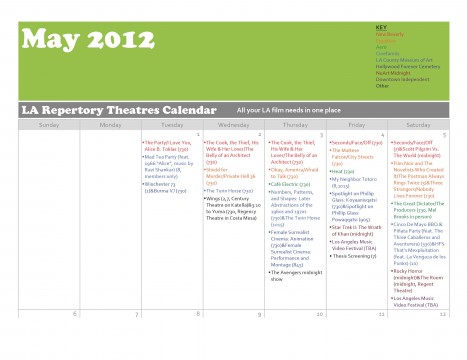
Cinephile’s Dream Calendar: May Edition
May 3, 2012
Welcome to the summer movie season! We’ve got
The Avengers
this week and over the next several months we get films like
Prometheus
and
The Dark Knight Rises
, films that could potentially become classics. However, we won’t be able to tell if they’re classics for years, so why not go see some films that are
already
classics?!
View all the Cinephile’s Dream calendars here. You can sign up to receive the calendar by email, or Tweet with the author.

Ladies and gentleman, we have reached the beginning of May, the time when school begins to slow down and the summer movie season ramps up. While you’ll definitely have your pick of summer popcorn flicks starting this week and running through the next three months, it certainly doesn’t mean you should stop going out to your favorite repertory houses because they too will be offering some great screenings. Below are a few that take place between now and May 15
th
and I think are worth your time.
Heat
– Even though they were the two biggest actors in the 1970s, Al Pacino and Robert De Niro never made a film together before Michael Mann’s crime masterpiece
Heat
. The story is something you have heard a million times before: two men on opposite sides of the law, one a criminal (De Niro) who has managed to evade the police for years, now setting up his “retirement heist.” The other, a cop (Pacino), who runs the robbery/homicide division of the LAPD and will stop at nothing to bring this criminal down after his gang murdered several armed guards in an armored car heist. Even though one is a criminal and one is a cop, their personal lives are eerily similar, with both men having a tumultuous personal life. When the criminal breaks the first rule taught to him by his mentor – never have anything in your life that you can’t walk out on in thirty seconds flat, if you spot the heat coming around the corner – and falls in love, he puts everything at risk, and his decision leads to a violent conclusion.
Like I said earlier, the basic story is something we have heard a million times before, but it is so well told and the characters are so deep, complex, and vivid that it feels as though we’ve never seen it before. Pacino and De Niro are at the top of their games here, providing A-level performances (it’s sad to look back on it now, seventeen years later and see what the pair have done since then, with only a handful of interesting performances between the two of them). The film, which is an expansion of Mann’s earlier made for television film
L.A. Takedown
, is the template for just about every crime film that followed it (the influence of 1994’s
Pulp Fiction
and
Heat
, released the following year, on the crime genre, is immeasurable). It also features, without a doubt, the greatest gunfight in any American film ever. Clocking in at nearly 12 minutes and taking place in the middle of downtown Los Angeles, the tension and horror
Mann
creates in this sequence alone is remarkable. The precision of the robbery is only matched by the precision of the filmmaking showing the robbery. The editing, performances, direction, and the sound work all meld together perfectly. Seeing it on the big screen should be a complete joy.
The Great Dictator
/
The Producers
– A double feature of comedies about Nazis sounds, well, actually kind of awesome, especially when the two films come from the genius comedy minds of
Charlie Chaplin
and
Mel Brooks
(
who will be at the screening
). Neither film is about the Holocaust, but Hitler (or Hynkel) is definitely a presence in both films.
The Great Dictator
was
Chaplin
’s first ”
talkie
.” Even nine years after the release of
The Jazz Singer
, Chaplin was still making silent comedies like
Modern Times
. However, when he decided to make a comedy about Hitler and the horrors taking place in Europe, he decided it needed to be a talkie to get his political views across (Chaplin was anti-Nazi far before it became popular in America, mostly because his half-brother Sidney was Jewish). In the film, Chaplin plays dual roles, playing both a Jewish Barber (a takeoff of his classic Tramp character) and Adenoid Hynkel, the ruthless dictator or Tomainia. The film is wildly inventive in both its comedy and its use of sound. Chaplin, before the film, had only used sound effects and score for sound in his films, but he came up with some incredibly interesting ways to use sound to his advantage (seeing him give an address as Hynkel using his fake German that sounds decidedly real is something he would never have been able to do in a silent film). As with every other Chaplin film, the highlight is seeing how Chaplin builds a sequence of comedy through visual and physical gags. Sequences involving the dueling height of barber chairs, a train coming and going through a train station, and, of course, the most famous moment of the film, Hynkel tossing a globe about as if it were his toy, are all nothing short of hilarious. Chaplin managed to show the brutality and ignorance of Nazism and make it funny, surrounding Hynkel with ridiculous characters like Benzino Napaloni (Jack Oakie playing Mussolini) and his main ministers Garbitsch and Herring. The final monologue, spoken by the Jewish Barber (who has been mistaken for Hynkel), is a truly brilliant and beautiful thing, one of those classic moments of pathos that Chaplin became famous for.
On the second half of the double bill is Mel Brooks’ debut film
The Producers
. Most people my age only know it as a Broadway musical and a rather lousy film adaptation, but the original film, released in 1968, is a comedy classic. Broadway producer Max Bialystock, played by the brilliant Zero Mostel, has fallen on hard times, with a string of unsuccessful shows, all of which he’s financed by romancing and seducing wealthy old women. One day while looking over his books, Bialystock’s nebbishy account, Leo Bloom (Gene Wilder) discovers a $2,000 overcharge from Bialystock’s last play due to the fact that he had raised more money than he needed. When Bloom mentions that someone could make a lot more money on a flop than a hit if they had a surefire flop, Bialystock decides to team up with Bloom to find the worst play ever written, raise the money to produce it, and then close after opening night, taking the rest of the money and moving out of the country so they can’t be prosecuted. Their quest leads them to the play
Springtime for Hitler: A Gay Romp with Adolf and Eva at Berchtesgaden
, written by a former Nazi living in New York City. They purchase the rights and cast a hippie as Hitler. As they move closer to production, they do everything in their power to make the show a disaster. When it opens, the critics and audience see it as satire (it was written in total sincerity) and it becomes critically acclaimed. What are Bialystock and Bloom to do with this surprise smash on their hands and how will they return their backers’ investments? If that description isn’t enough to get you into the theatre, I don’t know what is. The film was a huge hit when it was released in 1968 and won Brooks the Oscar for Original Screenplay (it also scored Gene Wilder an Oscar nomination). It started Brooks’ film career (which would include such classics as
Blazing Saddles
and
Young Frankenstein)
and is meant to be seen with an audience.
Yellow Submarine
– “Once upon a time, or maybe twice, there was an unearthly paradise called Pepperland. 80,000 leagues beneath the sea it lay, or lie. I’m not too sure.” The animation classic
Yellow Submarine
, featuring a soundtrack by The Beatles, was released in 1968 with little expectation of success (along similar lines to their first feature film
A Hard Day’s Night
in 1964). John, Paul, George, and Ringo wanted nothing to do with it. They saw it as the easy way out of their three-picture deal with United Artists (they didn’t even voice their own characters). It was been created by the same studio that did the Beatles Saturday morning cartoon show, which was nothing special in the looks department. The film was been made for less than a million dollars and in less than a year, with the script only being completed half way through production. It was a recipe for disaster, and yet, it was nothing short of a mind-bending masterpiece. Old Fred leaves Pepperland, a land of music and love, in a yellow submarine to look for help after the Blue Meanies attack and take over. He finds the Beatles and brings them back to his world, on a trip filled with fantastical creatures and stunning lands and together, they defeat the evil Meanies and bring peace back to Pepperland.
For years, the film was seen as a product of its time. The various animation styles used to create the film were heavily influenced by the art of the late 1960s (pop art in particular) and people were unsure if it would stand the test of time. In 1999, the film was re-released into theatres with a new 5.1 surround sound soundtrack (this was the first time the Beatles music had ever been remixed) and also released on DVD. The DVD has been out of print for years, but recently,
Apple hired a company to restore the film for a planned Blu-Ray release
. Because of the intricacy of the animation, the restoration team decided to restore the film by hand, frame by frame, instead of doing it with a computer. The results were screened at the South by Southwest Film Festival this year, and they were nothing short of stunning. The film looks better than ever before and sounds truly amazing. It was so well received that they decided to give the film a limited re-release into theatres before being released on home video. This is the one Beatles theatrical feature film I’ve yet to see in a theatre, and as a Beatles fanatic (I used to teach a class on them at UC Berkeley and at UCLA Extension), I will finally be able to cross the screening off my bucket list. While the film is screening twice at the Aero in Santa Monica, it is also playing at a number of theatres in Southern California on a variety of dates. To find a screening near you,
check this website for more information
.
Well that’s all for the first half of May. Stayed tuned for an update on the second half of the month soon, which will include more Beatles, some fantastic
Spielberg
, and a
Quentin Tarantino
double feature.

